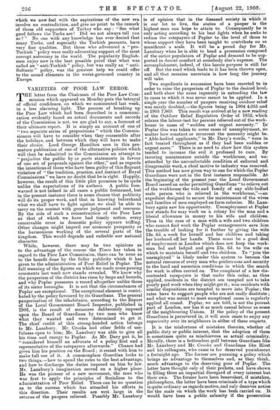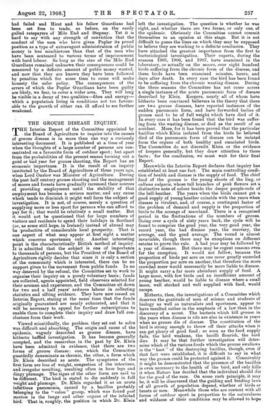VARIETIES OF POOR LAW ERROR. T HE letter from the Chairman
of the Poor Law Com- mission which appeared on Monday puts the betrayal of official confidence, on which we commented last week, in a less alarming light. The process of breaking up the Poor Law which had been described in a communi- cation evidently based on actual documents and records of the Commission is not, we are glad to say, a forecast of their ultimate report. It is simply an account of one of " two separate series of propositions " which the Commis- sioners will have to consider when they reassemble after the holidays, and between which they will have to make their choice. Lord George Hamilton sees in this pre- mature publication of one of the alternative policies which will then be submitted to the Commission an attempt to " prejudice the public by ex parte statements in favour of one set of proposals against the other," and as regards the intentions of those who have been guilty of this flagrant violation of " the tradition, practice, and instinct of Royal Commissions " we have no doubt that he is right. Happily, however, the result of this little plot promises to be quite unlike the expectations of its authors. A public fore- warned is not indeed in all cases a public forearmed, but in the present instance there is some chance that publicity will do its proper work, and that in knowing beforehand what we shall have to fight against we shall be able to carry on the contest with greater judgment and resource. By the side of such a reconstruction of the Poor Law as that of which we have bad timely notice, every conceivable error in domestic policy appears trifling. Other changes might imperil our economic prosperity or the harmonious working of the several parts of the kingdom. This would degrade and enfeeble our national character.
While, however, there may be two opinions as to the advantage of the course the Times has taken in regard to the Poor Law Commission, there can be none as to the benefit done by the fuller publicity which it has given to the administration of Poor Relief in Poplar. The fnll meaning of the figures on which we made some passing comments last week now stands revealed. We know why the pauperism of the district has risen by leaps and bounds, and why Poplar possesses a record altogether unlike those Of its sister boroughs. It is not that the circumstances of Poplar are exceptional. The exceptional element is contri- buted by the policy favoured by its Guardians. The general pauperisation of the inhabitants, according to the Report Of the Local Government Board Inspector, published in 1906, is the result of measures deliberately imposed upon the Board of Guardians by two men who knew what they wanted and were determined to get it. the chief credit of this strong-handed action belongs to Mr. Lansbury. Mr. Crooks had other fields of use- fulness open to him; Mr. Lansbury was able to give all his time and energy to Poplar. As Mr. Davy put it, he " considered himself an advocate of a policy first and a representative of the ratepayers afterwards." Chance had given him his position on the Board ; it rested with him to make full use of it. A commonplace Guardian looks to two things,—how to spend the rates to the best advantage, and bow to discharge the duties imposed on him by law. Mr. Lansbury's imagination moved on a higher plane. He was the pioneer of a new movement, the man who Was first to apply the principles of Socialism to the administration of Poor Relief. There can be no question as to the success which has attended his efforts in this direction. Their, results are writ . large in the returns of the paupers relieved. Possibly Mr. Lansbury is of opinion that in the diseased society in which it is our lot to live, the status of a pauper is the highest mau can hope to attain to. Consequently he is only acting according to his best lights when he seeks to reduce the ratepayers of Poplar to the level of those to whose support they have been taught to contribute on so munificent a scale. It will be a proud day for Mr. Lansbury when he is able to head a procession composed of the entire population of Poplar and demand to be sup- ported in decent comfort at somebody else's expense. The accomplishment, indeed, of this heroic purpose is still far off. But the road which leads to it has been thrown open, and all that remains uncertain is how long the journey. will take.
Two expedients in succession have been resorted to in- order to raise the pauperism of Poplar to the desired leveli- and both show the same ingenuity in extending the law to cases to which it was never meant to be applied. In a single year the number of paupers receiving outdoor relief was nearly doubled,—the figures being in 1904 4,055 and in 1905 7,869. This result was arrived at by a new reading of the Outdoor Relief Regulation Order of 1852, which relaxes the labour-test for persons relieved out of the work- house in cases of " sudden and urgent necessity."
Poplar this was taken to cover cases of unemploYment, no matter how constant or recurrent the necessity might be. " Able-bodied applicants," in Mr. Davy's words, " were in, fact treated throughout as if they bad been sudden or urgent cases." There is no need to show how this system. tended to increase the evil it professed to cure. 13y insuring maintenance outside the workhouse, and uip attended by the uncomfortable condition of enforced and disagreeable work, a chief motive to industry was removed. This method has now given way to one for which the Poplar Guardians were not in the first instance responsible. At the beginning of the present year the Local Government Board issued an order permitting Guardians "to relieve. out of the workhouse the wife and family of any able-bodied male person who is relieved in the workhouse, ,.an expedient designed to secure the maintenance of the wives and families of men employed on farm colonies. Mr. Lana- bury again saw his opportunity. Unemployment at Poplar now stands for easy work on a colony for the man and a liberal allowance in money to his wife and children. Thus in the case of a man with a wife and two children who cannot find work the Poplar arrangements save ltim the trouble of looking for it further by giving the wife 13s. 641. a week for herself and her children and taking her husband off her hands. There must be a good :deal of employment in London which does not keep the. work- man fed and lodged and give 13s. 61. to the wife.: on which to maintain herself and two children. To "join the unemployed " is likely under this system- to become-. the natural resource of every man who prefers ease and security to the hard and uncertain conditions in which the search for work is often carried on. The complaint of a few dis- contented ratepayers is that under this order, as thus applied, residents in the district are tempted not to take poorly paid work when they might get it ; non-residents.with similar dispositions are tempted to move into Poplar ; the rates have to support people who are not really destitute ; and what was meant to meet exceptional cases is regularly, applied all round. Poplar, we are told, is not the poorest part of London, nor has it as much casual labour as some of the neighbouring Unions. If the policy of the present Guardians is persevered in, it will soon cease to enjoy any superiority over its neighbours in either of these respects.
It is the misfortune of mistaken theories, whether of public duty or public interest, that the adoption of them is sometimes quite as mischievous as actual criminality. Morally, there is a bottomless gulf between Guardians like Mr. Lansbury and Mr. Crooks and Guardians like Hirst and his colleagues, who came in for deserved punishment a fortnight ago. The former are pursuing a policy which brings no advantage to themselves and, as they think, much advantage to the deserving poor of Poplar.. The latter have thought only of their pockets, and have shown in filling them an impartial disregard of every interest but their own. The former have been benevolent, if mistaken, philosophers, the latter have been criminals of a type which is quite ordinary as regards motive, and only deserves notice for the scale on which thework has been carried on. • It would have been a public calamity if the prosecution had failed and Hirst and his fellow Guardians had been set free to trade, as before, on the easily gulled ratepayers of Mile End and Stepney. Yet it is hard to say with any strength of conviction that the conduct of the men who have given Poplar its proud position as a type of extravagant administration of public money is less mischievous than that of the men who have been sentenced to various terms of imprisonment with hard labour. So long as the sins of the Mile End Guardians remained unknown their consequences could be measured by a definite amount of public money wasted, and now that they are known they have been followed by penalties which for some time to come will make honesty the safer policy. The consequences of the errors of which the Poplar Guardians have been guilty are likely, we fear, to cover a wider area. They will long be visible in a decay of two qualities—fibre and energy— which a population living in conditions not too favour- able to the growth of either can ill afford to see further weakened.



































 Previous page
Previous page